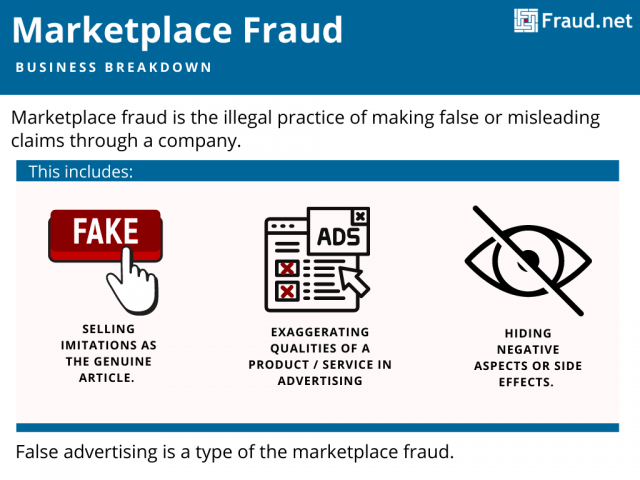Marketplace
A marketplace is the real, virtual or metaphorical space in which a market operates. The term is also used in the trademark law context to denote the actual consumer environment, i.e. the 'real world' in which goods and services are provided and consumed.
Marketplace Fraud
What is Marketplace Fraud?
Marketplace fraud is the illegal practice of making false or misleading claims through a company. This includes exaggerating the qualities of a product or service in advertising, selling imitations as the genuine article, or hiding negative aspects or side effects. False advertising is a type of the marketplace fraud.
An online marketplace creates a streamlined process for buyers and sellers to find one another. The first wave
of digital marketplaces came about with eBay’s launch in 1995. More product-focused marketplaces like these followed swiftly, from Amazon to WALMART's Jet.com.
Since then, online marketplaces have evolved to combine products and services. Whether it’s to buy something, rent a living space or get a ride, these marketplaces have spanned across various market segments from food to crowdfunding.
Types of Marketplace Fraud
- Fake Profile or Product Fraud - Common on marketplaces like Wish.com or Alibaba, a fraudulent seller copies the profile of a legitimate seller in order to deceive victims and turn a profit. This is damaging to the original sellers as well, as business is stolen. A potential customer is lost, and in some cases may never even receive a product.
- False Advertising - Misleading representation of goods or services through false or fraudulent claims or statements.
- Fake Buyer and Seller Closed Loop Account Fraud - A fraudster creates multiple fake buyer and seller accounts created. The fake buyers pay the fake seller for nonexistent items or services using stolen credit cards.
How to Stop Marketplace Fraud
Stopping marketplace fraud can be difficult for businesses. Keeping an important eye on marketplaces with similar products is vital to deter product fraud. Additionally, keeping an eye on your own customers, and those who purchase with fraudulent information, might indicate further resellers. Keeping tabs not only on public marketplaces, but the needs of those who are trying to manipulate the deep web, is another practice that will keep you ahead on the latest fraud trends.
The best way you can improve your fraud prevention on either sides of the market is by relying on ecommerce fraud prevention software. Machine learning fraud detection leverages billions of consortium transactions and outcomes to detect fraud. This is done at every stage of the customer life cycle, in real-time to detect unusual transaction patterns. AI crawlers that scan the deep and dark web keep the system up to date without the need to constantly set new rules in the software.
Fraud.net addresses these problems with a comprehensive and flexible fraud prevention platform, including AI / Deep Learning models, consortium fraud data, highly customizable case management and advanced analytics.
Learn More
- Visit the Ecommerce Industry page on our website
- Speak with a Fraud Prevention Specialist


